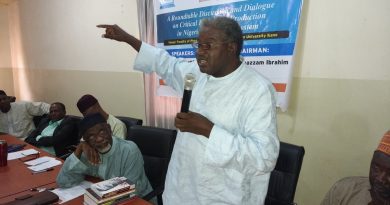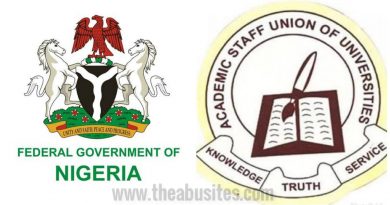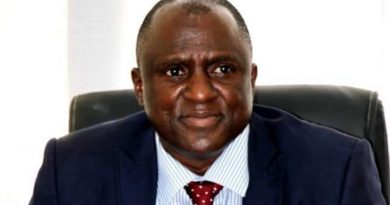Devastating Effects Of Incessant Asuu Strikes On Manpower Development
Although the Academic Staff Union of Universities (ASUU) has called off its 3-month old strike, it has its own cost implications, especially on the affected students. ZAKA ABD-KHALIQ writes.
When two elephants fight, it’s the grass that suffers the most. This is a semblance of what transpired between the federal government and the Academic Staff Union of Universities (ASUU) as students become the grass that are trampled upon each time a strike ensued.
Before ASUU called off its last strike, it was already three months off the campus for university students across the country except for a pocket of universities that refused to partake in the strike. One thing is pretty sure, all the affected students will need additional semester to make up for the three months old strike that had truncated their academic calendar, thereby, prolonging their stay on campus.
The last may not have been heard if the federal government fails to honour its promises, meaning that a student could waste a minimum of six months to labour strike within his four or five years stay on campus. Little wonder our tertiary institutions keep churning out half-baked graduates which recruiting companies consider unsuitable for employment.
Stakeholders believe that both parties are at fault. They said while the government has continued to underfund the educational sector, the staff of these citadels of learning are also mismanaging the little funding they are getting as well as tuition fees they get from students on an annual basis, even though two wrongs don’t make a right.

The bad news is that there might be another strike action from the lecturers in no distant future. According to ASUU president, Prof. Biodun Ogunyemi, “this is a suspension, not an outright call-off. If government reneges on our memorandum of agreement, we will embark on another industrial action with full force.”
The Two Elephants
ASUU began its recent strike on November 5, 2018, after its National Executive Council’s meeting in Akure, Ondo State, citing the failure of the government to honour its 2017 Memorandum of Action.
In the last two decades, LEADERSHIP learnt that ASUU has gone on strike for at least 15 times, in a bid to ensure that government listens and attends to its demands.
During the strike, students were sent back home, thereby, wasting precious time they are expected to spend on campus, while also prolonging their stay on campus. The three months old strike was later called off after a two hour meeting with the Minister of Labour and Employment, Dr. Chris Ngige on Thursday.
Ngige said eight areas of disagreements were discussed and agreed upon by the two parties at the meeting, while expressing gratitude to ASUU leadership for their understanding. The disbursement of N25billion to the public universities for their revitalisation by April and May 2019, was the first point in the new Memorandum of Action 2019 signed on Thursday between the union and the Federal Government’s delegation.
ASUU president, Prof. Biodun Ogunyemi, said the union will monitor the disbursement of fresh N25 billion by the federal government to public universities, which is expected to start in April 2019. He said he and a former ASUU president, Dr Nasir Fagge, were members of an implementation committee which would disburse the funds to the universities.
Ogunyemi said the union believes that the government would be truthful in the disbursement of the funds for the revitalisation of public universities in accordance with the recommendation of the NEEDS assessment report, warning that if the government failed ‘to fulfil its obligation, the struggle continues.’
The ASUU president said the disbursement of the funds to the universities would be strictly monitored to prevent misappropriation by some vice-chancellors as was allegedly witnessed in the past.
Earlier, Ogunyemi had spelt out the items in the newly-signed 2019 MoA, saying, “In addition to the N20bn for 2018, the sum of N25bn only would be released in April/May 2019, after which government would resume full implementation of the MoU of 2013.
“Secondly, there is the part-payment of the outstanding arrears of the earned academic allowances, defraying the balance up to 2018 in four tranches within 36 months and mainstreaming further payments of the Earned Academic Allowances into the annual budgets beginning from 2019 budget.”
He added that, “Others are the release of the arrears of salary shortfall at the Federal University of Agriculture, Makurdi, not later than February 15, 2019; strengthening the Consultative Committee on State-owned Universities inaugurated on Monday, January 28, 2019 and the payment of the outstanding EAA arrears of all eligible staff in the University of Ilorin, especially the loyal ASUU members whose appointments were illegally terminated.”
Asuu Strikes: Effects on The Students
The strike had brought academic activities in most Nigerian public universities to a halt. This disagreement between government and the academic unions often result in deadlock that usually disrupts academic calendar.
Incessant strike action by ASUU reduces the academic performances of students, even as most prolonged strikes distort the school calendar. As a result, students who are supposed to do a four- year course end up spending six years in the school for a simple programme.
Despite the poor research and innovation capability of the present set of universities, experts say incessant strikes will continue to jeopardise the research they are undertaking. Strike, the experts said, also has the tendency of leading undergraduates into some social vices like prostitution, oil bunkering, among others.
They believe there is a direct connection between economic development and educational growth. The monetary cost of any lost working day to ASUU strike is huge as it runs into billions of Naira, both in terms of salaries and wages, amongst others.
While recommending a re-evaluation of the education sector, they added that what often leads to strike in tertiary institutions should be addressed. ‘There is no doubt that the infrastructure in most of the schools are as old as the years of the schools, which is unacceptable,’ they stressed.
Conducive learning atmosphere, according to them, is sine-qua-non for quality education, stating that education should be properly and adequately funded to encourage effective research and to avoid brain drain. Proper funding and equiping of Nigerian universities, they said, will go a long way to stop further strike action.
They implored government to always try to honour whatever agreement reached with the academic unions as most protracted strikes can be averted if necessary steps are taken to build a good relationship between both parties.
According to Omosule Abimbola Lawrence, a final year student of Ekiti State University, “Frequent disruptions in the academic calendar compromise academic quality, frustrate students and prolong the duration of academic programmes. The social costs are immense too, for both students and their families.
It is disappointing that ASUU does not consider it appropriate to conduct a thorough scientific study of the repercussions of frequent strikes on various stakeholders within and outside the university system. As academics, they are supposed to manifest an unceasing desire for knowledge and truth.”
Stakeholders’ Response
Contrary to the opinion of some people that the strikes destroy the system, Sheriffdeen Tela, a Professor of Economics, Onabisi Onabanjo University, Ago Iwoye, Ogun State said, ASUU strikes, which are largely supported by its enlightened membership, have prevented the political class from destroying the educational system.
“Many tertiary institutions today, including the universities, can be confidently renamed “TETFund University” or “TETFund Polytechnic” because virtually all their buildings were constructed with money from TETFund, otherwise, they would have remained glorified secondary schools,” he said.
TETFund, he noted, was suggested by ASUU and is therefore a product of the union’s negotiations and struggle, even as the supply of funds from that source is being constrained by bureaucracy which seems to indicate that the political class is totally against quality education or generally against human capital development for Nigeria.
A major funding aspect that ASUU must pursue now, apart from completion of virtually abandoned ongoing projects, he said, should be for procurement of scientific instruments and equipment for scientific research outputs that are capable of promoting industrialisation with local contents to reduce importation of basic chemicals and additives, modern production in oil and gas industry, organic and inorganic agriculture, all of which are capable of unleashing employment and economic development with modern flavour.
Stating that staff of universities had to resort to strike because that is the only language government understands, he said: “Many times, people have suggested that ASUU should adopt other techniques besides the strike option but no one has suggested any or a particular option. I am aware that the union had tried some other methods, such as “work-to-rule’ or holding unto students results, in the past only to realise that the Nigerian government, irrespective of colour, acts only when the doors are shut against the students, provoking pubic reactions.”
A Public Analyst, Shafiu Ibrahim Abdullahi said, perennial strike by ASUU has become part and parcel of Nigerian university education, as hardly a full year pass without ASUU threatening to go on strike.
While the federal government take most of the responsibility for the continues strike in Nigeria, he noted that ASUU too has it own share of the blame as many analysts have become tired of some of these ASUU endless excuses for embarking on their strikes.
“For example, some of these lecturers themselves are not doing their job according to contract of their employment, as they engage in their personnel businesses and endless travels. These habits of the academicians have contributed in no small way in the present problems our university system is facing,” he stressed.
Despite the poor research and innovation capability of the present set of universities, he opined that incessant strike will continue to jeopardize the little research they are undertaking. According to him, “the kind of research and development activities that can put Nigeria in the league of developed nation cannot take place in a disruptive environment like the one we are currently witnessing in our universities. It is, therefore, clear that the current ASUU strike will have negative effect on our industries and from there our Gross Domestic Products (GDP).”
Before the strike was called off, the Independent National Electoral Commission (INEC) had said the strike will have serious impact on preparations for the conduct of the 2019 general election.
Chairman, Information and Voter Education Committee of INEC, Festus Okoye, said: “For the 2019 elections, INEC will recruit and deploy over one million adhoc staff made up of lecturers and students in federal tertiary institutions and corps members..
The bulk of assistant presiding officers will be drawn from students of institutions, INEC is presently organising root training for corps members and wants to begin that with students. So it is important and imperative that they are in school a month before the election for this to happen.”
But the strike was only called off a week to election. Prof. Kabir Akinyemi of the Faculty of Science, Lagos State University (LASU) said that the demands of ASUU were not outrageous.
He said the union had been magnanimous with the present administration since its inception. “ASUU cannot be treated like other unions in the country because in most cases, ASUU is always on the right direction in all facets of life,” he said.
Mr Olayinka Aderoju, Vice – Principal, Nigeria Tulip International College, Ogun branch said while the lecturers could not be blamed for demanding for their entitlement and better funding of the universities, embarking on strike was still not the best option .
Aderoju said this was because strike was no longer a veritable tool for negotiation in the global world. He noted that for the nation to overcome frequent strikes by lecturers and other unions, ASUU must demand for proper accountability and openness from the ruling government.








